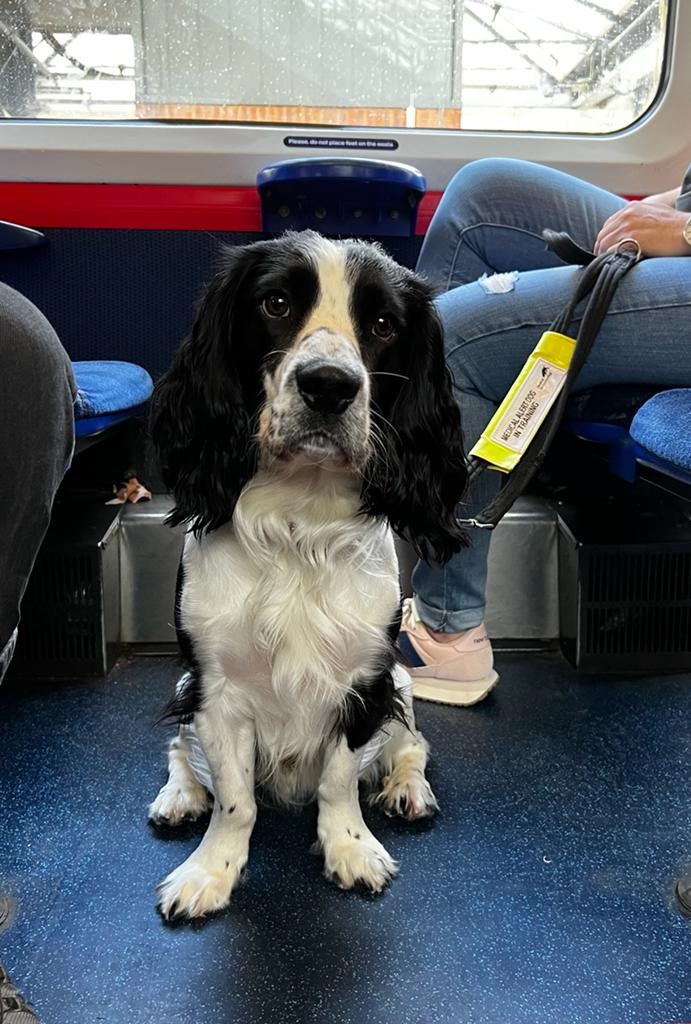
Assistance dogs play the smart card to support rail customers
- Rail companies launch information card and other aids for people supported by assistance dogs on trains
- The cards explain why the assistance dog needs space under an empty seat
- Assistance dog owners are able to book a free extra seat in advance on some services for their dog to lie under.
People who rely on assistance dogs to get out and about should find train travel easier thanks to a new scheme from train companies.
Train operators are providing thousands of people with physical disabilities or mental health problems with a handy laminated card that will help them educate fellow passengers. The card explains why the assistance dog needs to sit under an unoccupied seat. By raising awareness, this simple card should also improve the overall experience of passengers who want to use the railways with their assistance dog.
The cards can be particularly useful on services where it’s not possible to book a seat in advance. Most assistance dogs are trained by well-known charities registered with Assistance Dogs UK.
Jacqueline Starr, Chief Executive Officer of the Rail Delivery Group, said: “We’ve all seen guide dogs when they are out and about supporting their visually-impaired owners. It’s less well-known that many of our other four-legged friends have their own skills and character quirks that help people with a range of support needs. These include people with physical disabilities and those with autism, epilepsy or other complex health conditions.
“Many of these conditions are not visible so we want to make life easier for the people whose daily lives they affect. Being able to place the card on the seat next to them – together with the other ID the dogs carry – should achieve that on their train journeys. It will also help fellow passengers adjust to the sight of assistance dogs doing their job while apparently relaxing under a spare seat.”
The cards, which were tested with charity Assistance Dogs UK, can also act as a red flag for customers who are allergic to dogs or afraid of them.
Vicky Worthington, Development Manager with Assistance Dogs UK, said: “More than 7000 people rely on a highly trained assistance dog from one of our member charities alone. They enjoy the greater independence that such dogs bring, including when traveling.
“We’re delighted to support this scheme and very pleased to see that rail companies are making it easier for disabled people and people with medical conditions to travel while educating the public about how these wonderful animals change – and even save – lives.”
Fiona Bower, who travels on Southern and Thameslink, has used an assistance dog – Mr Wiz – for six years. She has been a wheelchair user because of her multiple sclerosis for 12 years and worked with the Rail Delivery Group and Govia Thameslink in developing the scheme.
Fiona said: "Mr Wiz, my registered assistance dog, and I welcome this new initiative which will be of tremendous benefit to all those passengers who, like me, depend on a specially trained dog to care for them."
Fiona is a member of Govia Thameslink’s voluntary panel of customers who represent people with a range of disabilities and access needs and advise on best practice.
Contact Information
Chris Mahony
Notes to editors
Notes to editors:
People who use wheelchairs will also be able to reserve space for their assistance dog around their wheelchair under the scheme.
Many of the assistance dogs wear different coloured harnesses, slip leads or jackets, depending on which charity trained them – and ID tags. However, this is not a legal requirement.
For more information, to arrange an interview or film an assistance dog on a train, please contact Chris Mahony in the Rail Delivery Group press office on 07812 692722 or email chris.mahony@raildeliverygroup.com
